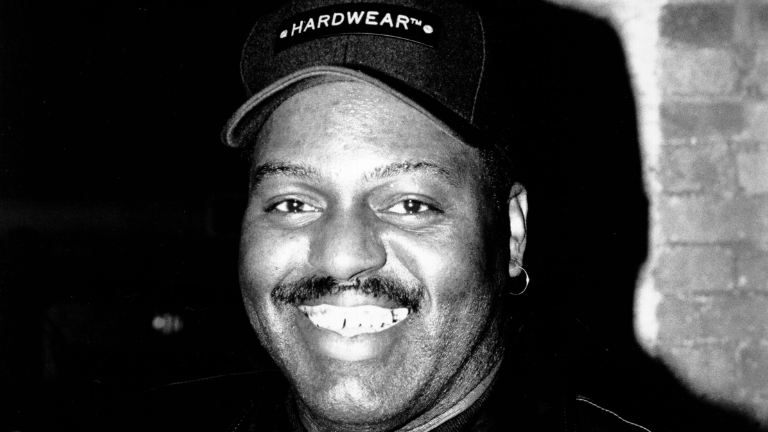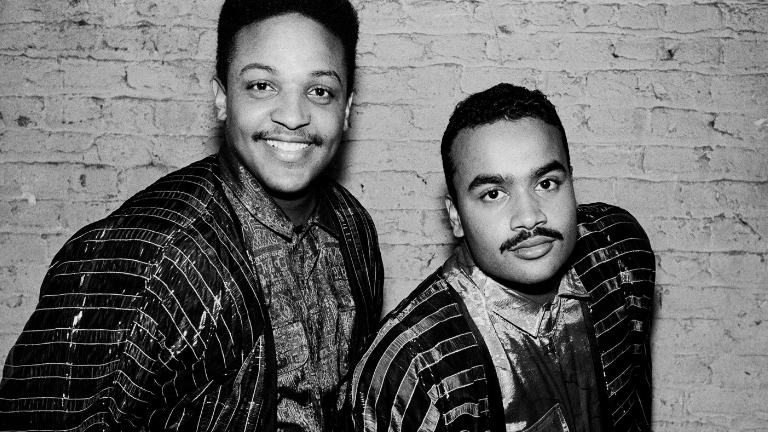In Celebration of Pride, Let’s Get into the History of House Music
Photo by: (Left) Frankie Knuckles by Steve Eichner/Getty Images. (Top Right) Jesse Saunders by Raymond Boyd/Getty Images. (Bottom Right) JM Silk by Paul Natkin/Getty Images.
It’s the first day of June, and you know what that means! Happy Pride Month!
As we kick off Pride month and Black Music Month, we have to give a specific genre of music its flowers. That’s right – House music transformed the music scene, dating back to the later 70s.
Looking at the origins of house music and its ties to the LGBTQ community, Black folks and people of color are credited for helping shape the dance music as we know it today.
As you may recall, on July 12th, 1979, during a Chicago White Sox game, fans stormed the field, declaring that disco was dead. The incident caused a lot of chaos as fans got more and more violent.
As a result, the LGBTQ+, Black, and Latino communities were compelled to adopt new kinds of decadence. Disco had become more associated with middle-American wedding banquets than the debauched expression of tongue-in-cheek sensuality that it had been previously.
In New York, the end of disco prepared the way for the birth of Hip-Hop. But, in Chicago, a similar movement was brewing.
Let’s look at the pioneers whose contributed their genius to help boost House music!
Larry Levan
Larry Levan was an American DJ best known for his ten-year residency at New York City’s Paradise Garage nightclub, termed “the prototype of the modern dance club.”
His performances were termed “Saturday Mass” because of his cult following.
Levan began his career at the Continental Baths as a stand-in for Nicky Siano, the DJ from The Gallery, who briefly employed both guys as decorators and taught them his groundbreaking three-turntable approach.
As a result, Levan’s DJing approach was influenced by Siano’s preference for Philadelphia soul and cheery rock and Mancuso’s jazz-inflected eclecticism.
While Knuckles was still attempting to get into the New York club scene, Levan’s “diva character,” which he had developed in the city’s notoriously competitive black drag “houses,” immediately became a big draw at venues such as SoHo Place.
Frankie Knuckles
Frankie Knuckles is most known for developing and popularizing “house” music, sometimes known as “Chicago house,” and named after the Warehouse nightclub in Chicago. He drew big crowds from 1977 through 1987.

Photo by: Al Pereira / Contributor
Many consider him the “Godfather of House,” an openly gay producer and remixer who began DJing as a teenager in New York in the early 1970s, years before the disco frenzy that ushered in the current dance music period.
Ten years later, he was in Chicago, mixing megamixes of vintage disco hits with modern drum machine pounding for a receptive audience at prominent venues like the Music Box and the Warehouse.
Knuckles won the Grammy Award for Non-Classical Remixer of the Year in 1997.
Ron Hardy
As a DJ and producer, Ron Hardy was a pivotal figure in the development of house music. He is regarded not only as a performer at the Muzic Box, a Chicago dance music club, but also as the genre’s inventor and creator.
During his time at the Muzic Box from 1982 to 1986, Hardy played records sent to him by local producers, including early demos by Chip E. and Steve Hurley, also known as J.M. Silk, in addition to disco edits and Italo imports (as did other club DJs at the time).
The Music Box’s raucous patrons were intrigued by Hardy’s style, which mixed continual tension and release with a pulsing narrative. In contrast to Frankie Knuckles, Hardy’s mark on house music was boundless energy and various ways to enthrall the crowd.
Five years after Muzic Box closed its doors, Hardy died from an AIDS-related illness on March 2, 1992.
J.M. Silk
Those that know House music know that Steve “Silk” Hurley, aka J.M. Silk, knows how to rock a club!
He is an American club DJ, pioneering house music producer, songwriter, and four-time Grammy Award, contender.

Photo by: Paul Natkin / Contributor
Two times as Non-Classical Remixer of the Year (in 1999 and 2000), and twice as Best Remixed Recording (in 1999 and 2000). (in 2002 and 2003).
Silk has written, remixed, and produced over 400 records, including chart-topping gold and platinum songs for musicians such as Michael Jackson, Prince, Crystal Waters, Yolanda Adams, CeCe Peniston, Boyz II Men, Janet Jackson, Chaka Khan, Madonna, Inner City, Jennifer Lopez, Donell Jones, and Byron Stingily.
Chip E.
Chip E. is another pioneer that helped shape House music into what it is today.
In 1982, he began spinning records, and by 1984, he was creating them. Chip E. was named the “Godfather of House Music” by Street Mix magazine in 1985.
By 1987, he became the first Chicago musician to be featured regularly on all three major Chicago radio stations, WBMX, WGCI-FM, and B96. Former B96 programming manager Joe Bohannon (Joe Bo) chose to add “If You Only Knew” to regular play, signaling the station’s shift from CHR (contemporary hit radio) to dance music.
“Time to Jack” and “It’s House” were among the songs on Chip E’s first record, Jack Trax, which was an extended play. Many people consider these songs to be the first House album and the first time the terms “Jack” and “House” were used to describe the genre.
Chip E. aided Frankie Knuckles when he co-produced his first album; You Can’t Hide. Chip also assisted Lidell Townsell, Kevin Irving, and Harri Dennis of The It in breaking into the music industry.
By the age of twenty-one, Chip E. had become a household name.
Farley “Jackmaster” Funk
Farley “Jackmaster” Funk is a DJ, record producer, and musician from Chicago, Illinois, specializing in house and acid house music.
He was noted for writing and producing a handful of very influential singles in the mid and late 1980s.
He and Jesse Saunders co-wrote the first house single to chart in the United Kingdom. In mid-1986, his anthem Love Can’t Turn Around, a rendition of Isaac Hayes’ “I Can’t Turn Around,” charted in the Top Ten.
Jesse Saunders
Jesse Saunders, also known as “The Architect of House music,” was introduced to Chicago’s nightclub culture at the age of sixteen, and the sounds of Frankie Knuckles and others sparked his interest.
He founded the Playground in 1982, which he still owns today. Saunders took advantage of the opportunity to integrate his content into his presentations when the Warehouse swiftly surpassed its capacity.

Photo by: Raymond Boyd/Getty Images
In early 1984, he and Vince Lawrence co-founded Jes Say Records and released “On & On,” the first official house music song.
Needless to say, “On & On” had massive success!
Who is your favorite pioneer of House music? Let us know down below!



